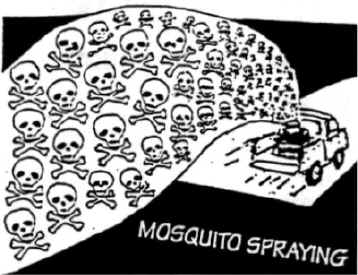 |
No Spray News James Irwin |
 |
No Spray News James Irwin |
March 11, 2002 Page 5
Say It, Don't Spray
It
North Carolina Says Education, Not Insecticide
Is the Way to Control Tiger Mosquito
Public Education about Aedes albopictus and Disaster Response.
("ULV strategies" = Mosquito spraying) |
Public education for the control of the Asian tiger mosquito (Ae.albopictus) is crucial for a successful mosquito control response after a disaster. Distributing Ae. albopictus brochures before a disaster increases the public's awareness about mosquitoes in their community. Brochures also provide the public with a point of contact that can be used to address mosquito questions as mosquito activity increases during recovery efforts. Ae. albopictus survives hurricane conditions very well. The Tiger mosquito is considered an urban mosquito and is usually found in direct proximity to populated areas. Rainfall produced by a hurricane can increase Ae. albopictus production by filling containers around residences. The tiger mosquito is a daytime flyer and cannot be effectively controlled using routine ULV strategies. It is usually the first mosquito to generate mosquito complaints after a disaster. Responding to mosquito complaints without considering the biology of the Tiger mosquito can confuse a program's adulticiding effort. Disaster assessments ot mosquito populations for ULV applications should exclude the Tiger mosquito. The most effective control strategy for the Tiger mosquito is public education. http://www.deh.enr.state.nc.us/phpm/local_programs/Disaster_Response/Ae_albopictus_an... |
What are you complaining about?
Sending the wrong signal -
Don't our local spraying programs
undermine public education efforts, by reinforcing the commonly held belief that spraying
is the way to control our mosquitoes?